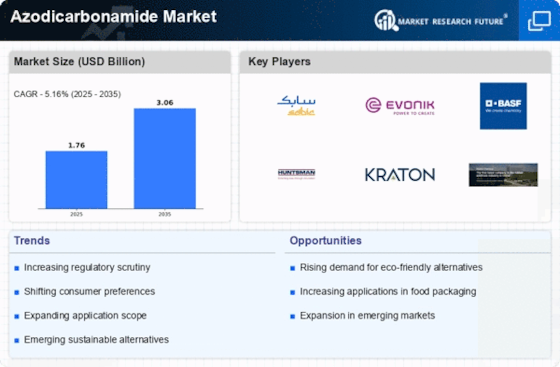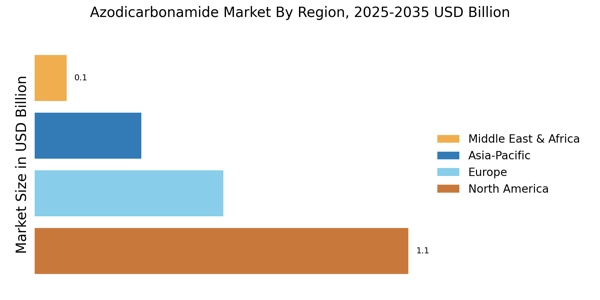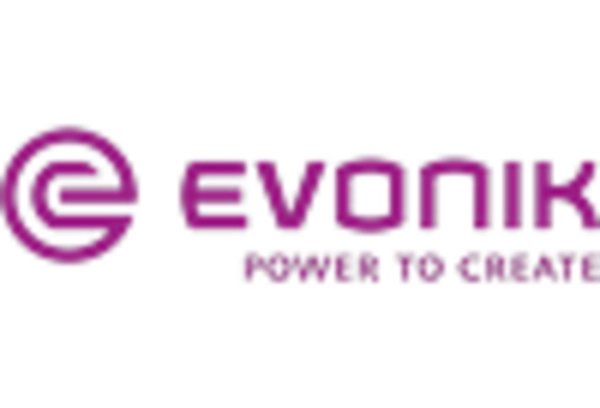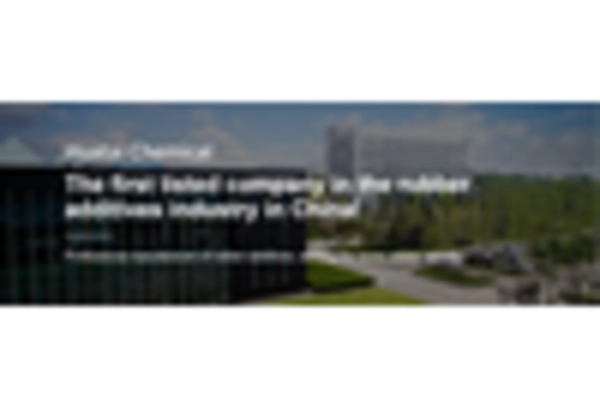Rising Demand in Food Industry
The Azodicarbonamide Market is experiencing a notable increase in demand from the food sector, particularly in the production of bread and other baked goods. This compound serves as a dough conditioner, enhancing the texture and quality of the final product. As consumers become more discerning about food quality, manufacturers are increasingly incorporating Azodicarbonamide Market to meet these expectations. The food industry is projected to account for a substantial share of the Azodicarbonamide Market, with estimates suggesting a growth rate of approximately 5% annually. This trend indicates a robust potential for expansion within the market, driven by the need for improved food processing techniques and the rising popularity of convenience foods.
Innovations in Polymer Production
Innovations in polymer production are playing a crucial role in the Azodicarbonamide Market. The compound is widely used in the manufacturing of various polymers, including PVC and thermoplastics, which are integral to numerous applications such as automotive and consumer goods. The polymer industry is expected to grow at a compound annual growth rate of 6% over the next few years, which could lead to increased utilization of Azodicarbonamide Market. As manufacturers seek to improve the properties of their products, the demand for this compound is likely to rise, indicating a positive outlook for the Azodicarbonamide Market.
Growth in Construction Applications
The Azodicarbonamide Market is also witnessing significant growth due to its applications in the construction sector. This compound is utilized as a blowing agent in the production of foamed plastics, which are essential for insulation and lightweight construction materials. The construction industry is projected to grow at a rate of 4% annually, thereby increasing the demand for Azodicarbonamide Market. As urbanization continues to rise, the need for efficient building materials becomes paramount. Consequently, manufacturers are likely to invest in Azodicarbonamide Market to enhance the performance of their products, further driving the market's expansion.
Environmental Regulations and Compliance
The Azodicarbonamide Market is influenced by stringent environmental regulations that govern the use of chemical additives in various applications. As regulatory bodies impose stricter guidelines, manufacturers are compelled to ensure compliance, which may lead to increased demand for Azodicarbonamide Market as a safer alternative. The market is expected to adapt to these regulations, with a projected growth rate of 3% as companies seek to align their products with environmental standards. This shift not only enhances the market's sustainability but also opens avenues for innovation in product formulations.
Expanding Applications in the Medical Sector
The Azodicarbonamide Market is witnessing an expansion of applications within the medical sector. This compound is being explored for its potential use in medical devices and packaging materials due to its properties that enhance durability and performance. The medical industry is anticipated to grow at a rate of 5% annually, which could significantly impact the demand for Azodicarbonamide Market. As healthcare providers and manufacturers prioritize quality and safety, the incorporation of this compound may become more prevalent, suggesting a promising future for the Azodicarbonamide Market.

















